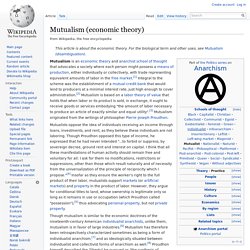

Economie Circulaire. New Found Moolah. New Busyness. Cooperatives, Nonprofits. Mutualism (economic theory) Mutualism is an economic theory and anarchist school of thought that advocates a society where each person might possess a means of production, either individually or collectively, with trade representing equivalent amounts of labor in the free market.[1] Integral to the scheme was the establishment of a mutual-credit bank that would lend to producers at a minimal interest rate, just high enough to cover administration.[2] Mutualism is based on a labor theory of value that holds that when labor or its product is sold, in exchange, it ought to receive goods or services embodying "the amount of labor necessary to produce an article of exactly similar and equal utility".[3] Mutualism originated from the writings of philosopher Pierre-Joseph Proudhon.

Mutualists have distinguished mutualism from state socialism, and do not advocate state control over the means of production. Mutualism, as a term, has seen a variety of related uses. For historian of the First International G. Barter Trade Exchange. MI Alliance of TimeBanks - How It Works. At its most basic level, TimeBanking is simply about spending an hour doing something for somebody in your community. That hour goes into the TimeBank as a Time Dollar. Then you have a Time dollar to spend on having someone doing something for you. TimeBanks USA. Timebanking UK: a guide for setting up your own time bank. Create your Time Bank site.